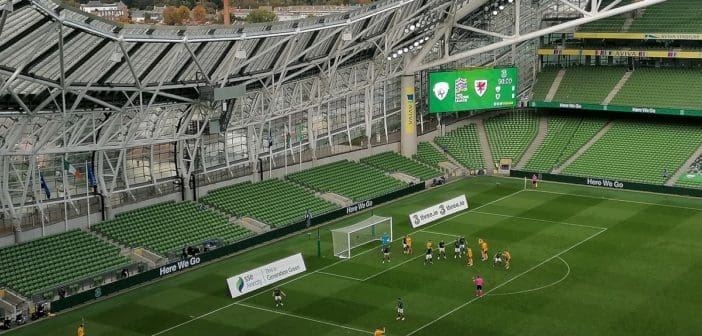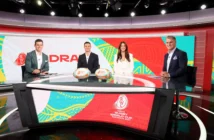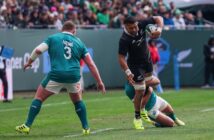Republic of Ireland 0 – 0 Wales
International football in a large, empty stadium is a surreal experience. The press box high in the bedpan-like Aviva in Dublin, sparse with face-masked journalists, was eerily silent as Ireland came out to face Wales in the UEFA Nations League. This is a derby that’s traditionally been a good-natured extravaganza of city-centre drinking and friendly rivalry, but had none of that today.
These two teams have faced off countless times in recent years, but the talk of Irish football these days is not so much who they face, but the impact of the coronavirus on their own team. Ireland crashed out of the knock-out European Championship qualifying play-off tournament away in Slovakia on penalties last week, a game they should, on balance, have won.
The home side were missing two attack-minded players due to positive coronavirus tests that day, later thought to be ‘false positives’, but both Adam Idah and Aaron Connelly were sent home too early to participate here.
The morning of the Wales games, news broke that five more – one positive, and four ‘close contacts’ from the squad, their identities kept quiet – were to be isolated for this contest, too. Alongside covid concerns, the fall out of a recently-published book on the debauchery and misguided spending of former FAI chairman John Delaney, ‘Champagne Football’ continues to echo, though the association has changed much since the end of his tenure a year ago and is showing promising signs of reform.
Facing a Wales team with plenty of experience in their ranks, then, Ireland looked seriously depleted up front, even for a team that’s long found finding the net a bit of a challenging endeavour, handing new-ish coach Stephen Kenny a tough task.
The Aviva would typically be crammed with tens of thousands of rowdy fans, located at a spot where the walk to the stadium helps the matchday come alive, but instead, every word of communication between the players could be heard from up in the Gods.
Much of the early contest was played around the backlines, with both sides attempting to probe down the wings but producing little in the way of clear cut chances, and lots of slightly regressive keep ball through loaded defences, though Juventus man Aaron Ramsey was showing obvious class in the Wales playmaker role early on.
Ireland created scrappy chances from two consecutive corners in the 20th minute, and in the 26th minute Ramsey found some space down the middle after a smooth Wales move, forcing a diving save down to his right out of Randolph in the Ireland goal, though the shot came in at a comfortable height for the West Ham man.
Jayson Molumby, an increasingly regular Ireland participant, caused momentary panic in the Wales defence as he stumbled his way past two challenges and the game started to open up, but typically of these contests, the early stages were not classics of attacking football, with defences very much on top.
Wales wanted a penalty on the half hour mark, as Randolph fumbled a cross and took out Ethan Ampadu as he reclaimed the ball, a 50/50 call. At the other end shortly afterwards, Robbie Brady hit the stanchion after breaking from midfield, with Hennessy in the Wales goal beaten.
Cyrus Christie knocked one just over from the edge of the box for Ireland on 43 minutes, but on balance the defences were winning come half time, with the odd moment of space or flair from either side leading largely to pot shots or movement just a little too slow. Ireland increasingly looked on top, the new passing philosophy of recently appointed coach Kenny to the fore.
Early in the second half, Shane Long had a great chance as he found himself on the end of a Stevens ball in from the left after neat play between Stevens and Hendrick, but couldn’t control and headed well over.
A Brady cross from the right swung in and evaded everyone, going just wide, as Ireland increasingly controlled possession against the Welsh high press, but the match waxed and waned for much of the second half, with neither side offering a convincing argument for being in front. Ireland’s double replacement up-front with 15 minutes to go was particularly indicative of how ineffective that depleted frontline had proven.
Wide man Daryl Horgan offered an immediate injection of urgency, and within three minutes he gave Ben Davies a torrid time at left back, and then forced a save from Hennessy before blasting over off-balance from the rebound from ten yards out.
The ever-aggressive Ireland captain James McLean was sent off with seven minutes to go, largely for his typically-undisciplined retaliation following a series of flying tackles wide on the Ireland left. That led to a closing period in which despite Horgan’s continued threat, Wales were on top. Neither side, in the whole 90 minutes, looked particularly close to scoring.
There’s already a certain frustration amongst Ireland fans with the lack of results under Kenny, even so early in his career as Ireland manager. It’s one that’s rooted in part in the disdain in which some Ireland fans hold their local league, the League of Ireland: until he took the under-21 job in late 2018, Kenny plied his trade with overachieving Dundalk, and had previously been in charge at Shamrock Rovers and Bohemians.
If Kenny’s going to bring fans around – and this reporter has a gut feeling he will, eventually – it’s this kind of neat football that’s a good first stepping stone, even if it does come with little end product and only a single shot on target.
Staying in the Nations League second tier is big, though: it’s hard to imagine the Aviva drawing fans back even post-covid with opposition from Europe’s third of four levels. For that reason alone, results need to come soon as Ireland battle to stay off the bottom of their group – one Wales are winning – at the midway stage. For now, a neater, more compact Ireland with a limited end product will have to do.
Ireland: Darran Randolph (gk, West Ham), Matt Doherty (Tottenham), Enda Stevens (Sheffield United), Shane Duffy (Celtic), Conor Hourihane (Aston Villa), Shane Long (Southampton), Robbie Brady (Burnley), James McClean (c, Stoke City), Jeff Hendrick (Newcastle United), Kevin Long (Burnley), Jayson Molumby (Brighton)
Subs: Cyrus Christie (Nottingham Forest, replaced Long, ‘25); Daryl Horgan (Wycombe Wanderers, replaced Brady, ‘73); Sean Maguire (PNE, replaced Long, ‘73); Josh Cullen (Anderlecht, replaced Molumby ‘90)
Red card: James McClean (‘83)
Wales: Wayne Hennessy (Crystal Palace), Connor Roberts (Swansea City), Ethan Ampadu (Sheffield United) , Joe Rodon (Swansea City), Ben Davies (Tottenham), Joe Morrell (Bristol City), Matt Smith (Arsenal), Ramsey (c, Juventus), Wilson (Liverpool), Kieffer Moore (Cardiff City), Daniel James (Manchester United).
Subs: Dylan Levitt (Charlton Athletic, replaced Smith, ‘66), Nico Williams (Liverpool, replaced Wilson, ‘66), David Brooks (Bournemouth, replaced James, ‘77)
Follow us on Twitter @ProstInt
![Prost International [PINT]](https://prostinternational.com/wp-content/uploads/2021/08/PINTtFontLogoRoboto1536x78.jpg)



